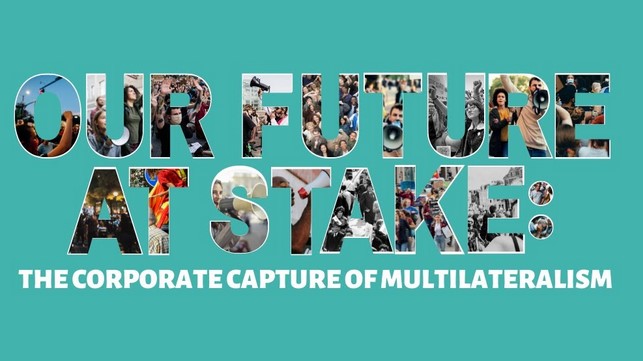
Open Letter
Beware the Corporate Multistakeholder Strategy in Civil Society Clothin
Instead of strengthening civil society and social movement voices, the Nairobi Civil Society Conference in support of the Summit for the Future aims at bringing back to the agenda corporate-led global governance.
The 2024 UN Civil Society Conference in Support of the Summit of the Future (SOTF), sponsored by the Department of Global Communications under the UN Secretary-General Office (OSG), has emerged as an attempt to bring back to life ideas and methodologies that States and civil society organizations themselves have already definitively rejected throughout the process towards this Summit, as reflected in the Zero draft elaborated by the SOTF Co-Facilitators.
According to the concept note that the appointed civil society co-chairs for the Nairobi CSO Conference presented publicly on March 11th, it aims to be inclusive, innovative, and “impactful”. Being “impactful” encompasses the proposal to establish “multi-stakeholder Smart Coalitions constituting Member States, civil society, academia, think tanks, foundations, and the private sector, to champion, act on, and push forward specific issue areas or big-ticket reforms proposed in the consensus language of the Pact…. this civil society-hosted, multistakeholder “Pact Package” seeks to be a step one in setting up multi-stakeholder implementation of key reforms and issues across the Pact for the Future.”
As the concept note makes explicit, the outcome of the Nairobi event is to set up a “CSO´s [multistakeholder] support system” and not to have a “final [independent civil society] negotiated text”. In other words, it does not intend to facilitate contributions to the contents of the Pact for the Future. Instead, the goal is for the Nairobi Conference is to generate a set of multistakeholder “smart coalitions” for the implementation of policies and guidelines that they believe will be adopted by the States in the Pact for the Future. This creates parallel structures that undermine the real transformation and participation of communities and people affected by human rights violations. Further, it seeks to advance into the arena of states’ implementation responsibility, without even consulting the states about it. Furthermore, it ignores the serious concerns about the role of corporations and their conflict of interests in shaping global governance, which civil society has raised repeatedly in multilateral negotiations and processes including on the road towards the Summit of the Future.
The organizers of the Nairobi initiative have embraced, and are promoting, the idea of a “networked and inclusive multilateral process”, incorporating and promoting the proposals of “Our Common Agenda” for a multistakeholderism of the willing, which is unaccountable, more asymmetric, and less democratic. The UN’s regrettable partnership with the World Economic Forum (WEF) looks strong. An outcome of this was the recent experience of the UN Food Systems Summit, which has been symbolic of how corporate-driven multistakeholderism ensures agendas friendly to corporate interests and fails to address structural drivers of hunger, malnutrition, and ecological destruction.
Multistakeholder governance, with corporations and their hybrid associations at the core, is not the solution to current global crises, nor for the “modernization” and reform of the UN. On the contrary, we see it as an extremely worrying sign of the increasing corporate capture of the UN multilateral system, and subversion of the very basis of multilateralism rooted in decision-making among States. The proliferation of multistakeholder mechanisms in global governance has made it neither more inclusive nor more efficient. Instead, it has been inclusive mainly of corporations and efficient only for realizing their interests. It has further marginalized the majority of States, resulting in deepening asymmetries between developed and developing countries and vis-a-vis developing states and corporate bodies (including their foundations), as well as further bolstering the influence of corporations while diminishing the role of civil society organizations.
From the perspective of the Office of the UN SG, it is clear that the Nairobi meeting intends to be able to announce to the world that civil society also wants multistakeholderism. In failing to get the G77 and China Group to accept MSism directly via the OCA, the OSG has recruited selected sectors of the CSO community to be promoters for MSism. The details of the program and the topics/membership of any ‘smart coalitions’ are not as important as the larger political message that CSOs support corporate multistakeholder governance.
The goal of the Nairobi Civil Society Conference in Support to SOTF is primarily to provide legitimacy to mechanisms of global governance that are highly contested by many States, civil society organizations, and social movements which understand well how multistakeholder governance crystalises inequalities and benefits corporations, instead of promoting inclusiveness and the rights of peoples.
With this letter, we are broadly raising the alarm among social movements and civil society organizations, including those considering to participate in the Nairobi Conference, about these very worrying developments. We strongly denounce this instrumentalization of civil society and demand the immediate opening of a process for a flexible, democratic, bottom-up format for all processes leading up to the SOTF. This includes a substantive and balanced civil society consultative process within the framework of ECOSOC rules and the democratic tradition and practice of the UN, as part of the process of meaningfully engaging with States towards a Pact of the Future at the SOTF.
Our commitment to a more democratic and participatory multilateral system precedes the Summit of the Future and will continue once it´s concluded. We keep protesting and resisting any form of corporate capture of the UN. We call on civil society to join this effort in Nairobi, the SOTF process, and, wherever its participation is demanded to build a just and sustainable world.
March, 26th 2024
Peoples´ Working Group on Multistakeholderism